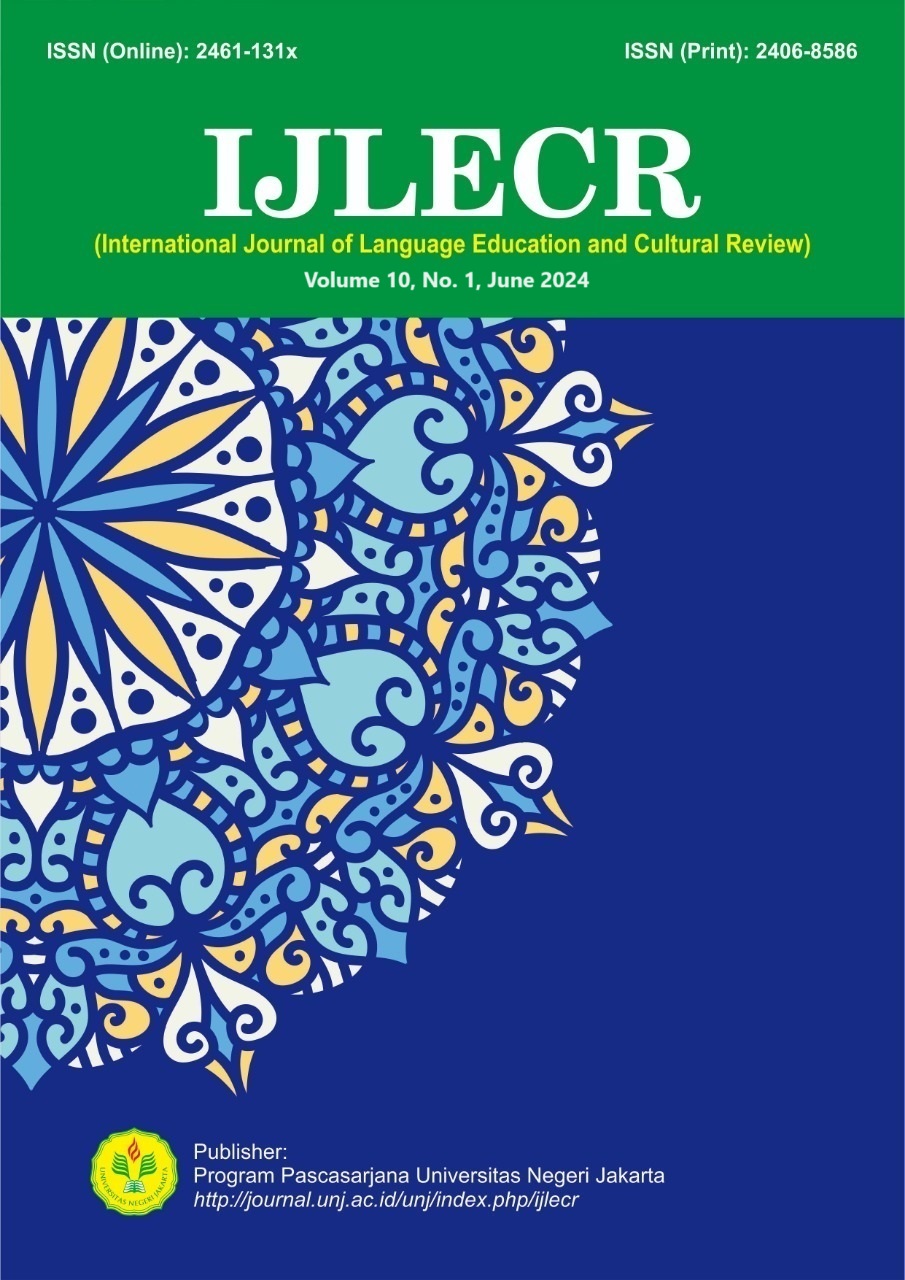Looking into EFL Students’ Intercultural Awareness and Its Relation with Varying Social Media Exposure and Reading Ability
DOI:
https://doi.org/10.21009/ijlecr.v10i1.43880Kata Kunci:
EFL Students, Intercultural Awareness, Social Media, Reading AbilityAbstrak
With explosive growth of technology and globalization, seeing vastly different culture has become part of our daily life as seen in social media. Students’ social media exposure is closely related to their reading activity. Thus, great reading ability leads to great intercultural awareness. This study aimed to investigate EFL students’ intercultural awareness and its relation with varying social media exposure and reading ability. The quantitative study employed ex-post-facto design, with participation of 183 EFL students purposively recruited from Informatics Study Program in a private univerisity in Jakarta, Indonesia. The data collected using online questionnaires and reading tests were analyzed using SPSS 27. With this software, descriptive statistics were made to compare means, percentages, and standard deviations of students’ intercultural awareness. Paired-samples t-tests were run to find out a significant difference in participants’ intercultural awareness by varying social media use and reading ability. The results revealed EFL students’ high intercultural awareness with no significant difference found in students’ varying social media use and with a significant difference found in students’s varying reading ability. In conclusion, EFL students’ intercultural awareness is influenced significantly by their reading abilities rather than their social media exposure.
Referensi
AH Sanaky, H. (2013). Media Pembelajaran Interaktif-Inovatif. Yogyakarta: Kaukaban Dipantara
Akhmetova, Dalbergenova. Sprechangst im DAF Unterricht, 2021. https://elib.bsu.by/handle/123456789/262168
Arikunto, Suharsimi. (2010). Prosedur Penelitian Suatu Pendekatan Praktik. Jakarta: Rineka Cipta
Chicioreanu, T. D., & Amza, C. G. (2018). ‘Adapting your teaching to accommodate the NetGeneration/Z-Generation of learners’. 14th International Scientific Conference eLearning and Software for Education, 19-20 April 2018, Carol I National Defence University Publishing House.
David, E. R. (Eribka), Sondakh, M. (Mariam), & Harilama, S. (Stefi). (2017). Pengaruh Konten Vlog Dalam Youtube Terhadap Pembentukan Sikap Mahasiswa IlmuKomunikasi Fakultas Ilmu Sosial Dan Politik Universitas Sam Ratulangi. ActaDiurna, 6(1), 93363. https://www.neliti.com/publications/93363/pengaruh-konten-vlog-dalam-youtube-terhadap-pembentukan-sikap-mahasiswa-ilmu-kom
(PDF) Konten Vlog Sebagai Kebiasaan Komunikasi Siswa/I SMP Nusantara Plus. Available from: https://www.researchgate.net/publication/368257042_Konten_Vlog_Sebagai_Kebiasaan_Komunikasi_SiswaI_SMP_Nusantara_Plus[accessed May 30 2023].
Djajadi,M.(2019). Pengantar Penelitian Tindakan Kelas (Classroom Action Research).CV. Arti Bumi Intaran. Yogyakarta https://www.goethe.de/pro/relaunch/prf/materialien/A1_fit/fit1_uebungssatz_01.pdf
Griffin, P et al. (2012). Assestment and Teaching of 21st Century Skills. Heidelberg, Lomdon, Newyork: Springer
Gay,L.R. Mills, Geoffrey E. Airasian, P. (2009). Educational Research Competencies for Analysis and Aplications. New Jersey: Pearson Education.
Gerigk, Kevin F. (2022). Teacher-talk and Facebook: An enquiry into pedagogical expectations of GenZ EFL Learners in Germany. Lancaster : Eltria https://pskp.kemdikbud.go.id/produk/artikel/detail/3133/gen-z-dominan-apa-maknanya-bagi-pendidikan-kita
Iskandar, I., Sumarni, S., Dewanti, R., & Asnur, M. N. A. (2022). Infusing Digital Literacy in Authentic Academic Digital Practices of English Language Teaching at Universities. International Journal of Language Education, 6(1), 75-90.
Krumm H-J, Fandrych C, Husfeisen B, Riemer C (Eds). (2010). Deutsch als Fremd und Zweitsprache. Ein Internasionales Handbuch Handbücher zur sprach- und Kommunikationswissenschaft/HSK, 2. Und vollständig überarbeitete und neu zusammengestellte Auflage. Berlin/New York: de Gruyter.
Lancaster, L.C., & Stillman, D. (2004). When generations collide: Who they are, why they clash, how to solve the generational puzzle at work.’ Harper Collins.
Nuraripah, P. Sari, D.R., Armeth, A, Handayati, E.S. (2023). Efektivitas Pembelajaran Vlog Berbasis Zoom Pada Mata Kuliah Perencanaan Pembelajaran Prodi PAI di IAIN Manado. Islamika. V5i2.2875
Saud, S., & Asnur, M. N. A. (2018). Dampak experiential learning dalam pembelajaran keterampilan berbicara bahasa Jerman mahasiswa di perguruan tinggi. In Prosiding Seminar Nasional Dies Natalis UNM Ke 57, (pp. 383-391). Badan Penerbit UNM.
Stillman, D., Stillman, J. (2017). Gen Z @ work : How The Next Generation is Transforming the workplace. New York: Harper Business
Surahman, E., Santaria, R, & Seiawan, E. I. (2020). Tantangan Pembelajaran Daring di Indonesia Pendahuluan Pembelajaran Daring adalah Proses Pembelajaran yang Dilakukan. Journal of Islamic Education Management
Suryana, D. (2023). Penerapan Model Pembelajaran Berbasis Proyek untuk Meningkatkan Hasil Belajar. PTK, Vol.3 No.2
Theresia, E., & Ayu, I. R. (2023). Pengembangan Media Video Blog ( Vlog ) Berbasis KearifanLokal Materi Kegunaan dan Siklus Air Pada Siswa Kelas V SD. 11(1), 191–204.https://doi.org/10.25273/jems.v11i1.14400T
Wiayanti, A. R. Y, Arafat, A. (2023). Peningkatan Hasil Belajar Mahasiswa Perencanaan Hutan Melalui Model Pembelajaran Collaborative Learning. PTK, Vol.3 No 2








